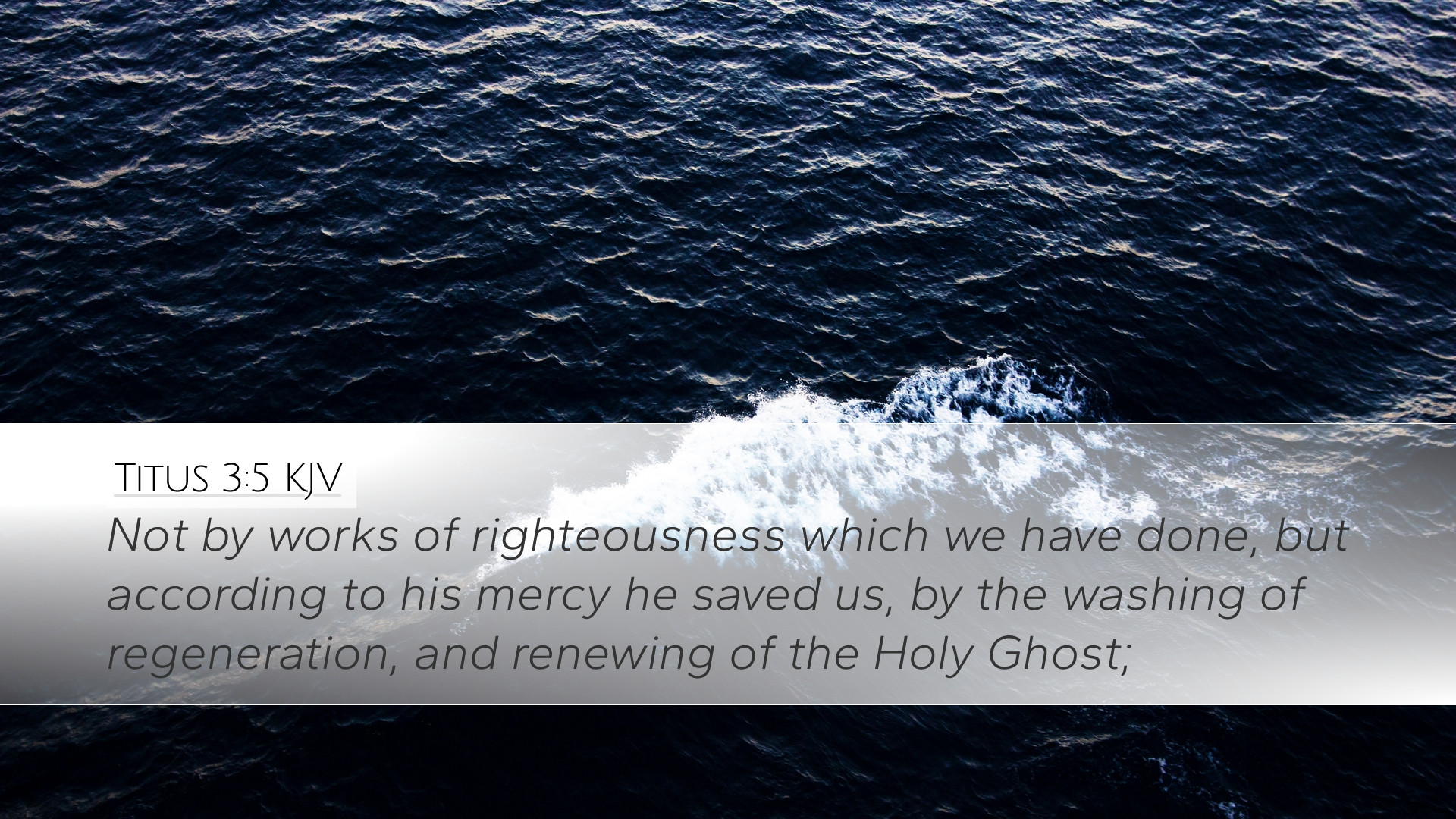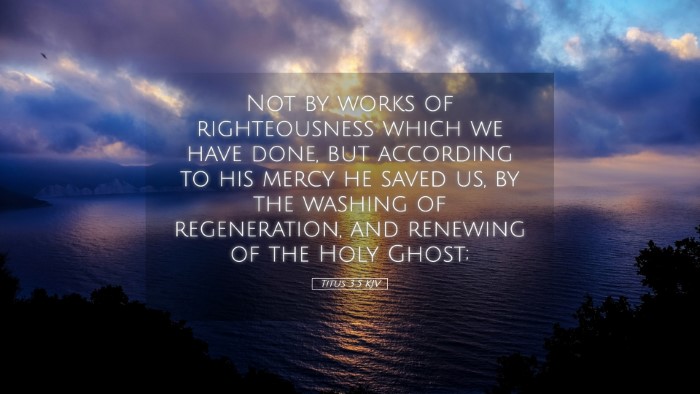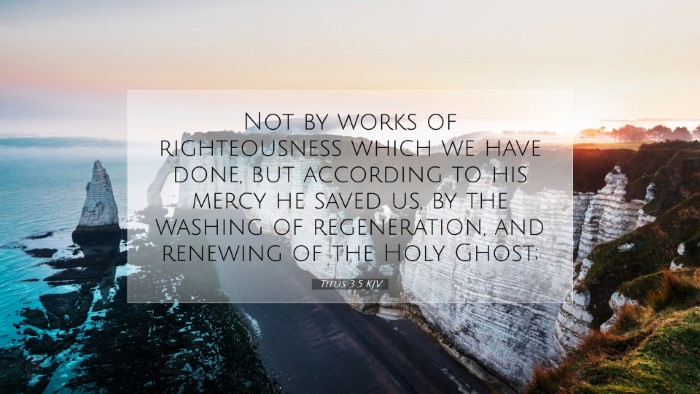Old Testament
Genesis Exodus Leviticus Numbers Deuteronomy Joshua Judges Ruth 1 Samuel 2 Samuel 1 Kings 2 Kings 1 Chronicles 2 Chronicles Ezra Nehemiah Esther Job Psalms Proverbs Ecclesiastes Song of Solomon Isaiah Jeremiah Lamentations Ezekiel Daniel Hosea Joel Amos Obadiah Jonah Micah Nahum Habakkuk Zephaniah Haggai Zechariah MalachiTitus 3:5
Titus 3:5 KJV
Not by works of righteousness which we have done, but according to his mercy he saved us, by the washing of regeneration, and renewing of the Holy Ghost;
Titus 3:5 Bible Commentary
Titus 3:5 Commentary
Bible Verse: Titus 3:5 - "Not by works of righteousness which we have done, but according to his mercy he saved us, by the washing of regeneration, and renewing of the Holy Ghost."
Introduction
This verse encapsulates the essence of Christian salvation and the transformative power of God's grace. In commentary of Titus 3:5, we draw upon the insights of notable public domain theologians such as Matthew Henry, Albert Barnes, and Adam Clarke. Together, they provide a comprehensive understanding of the theological implications of this scripture.
Context of the Epistle
The Epistle to Titus was penned by the Apostle Paul, addressing the needs of the young church in Crete. Titus, a key figure in Paul's ministry, is instructed on church organization, sound doctrine, and the practical aspects of living out faith. The context of Titus 3:5 is pivotal; it speaks to the necessity of divine intervention in the salvation of believers.
Not by Works of Righteousness
Matthew Henry's Insight: Henry emphasizes that salvation is not rooted in human merit or righteousness. He argues that all human attempts at righteousness are ultimately flawed when compared to God's standards. This assertion calls believers to humble recognition of their need for divine mercy.
Albert Barnes' Perspective: Barnes elaborates that Paul is discouraging confidence in our own deeds. He articulates the idea that no amount of righteous acts can secure God's grace; it is a gift. Something achievable through human effort cannot reconcile us with God.
Adam Clarke's View: Clarke underscores this message by noting that the works of righteousness refer specifically to the deeds prescribed by the Mosaic Law. He clarifies that such deeds, while good in themselves, cannot produce salvation and thus must not be the foundation of our faith.
According to His Mercy
Matthew Henry's Commentary: Henry points out that the very basis of salvation lies in God's mercy. He quotes the phrase "according to His mercy" to highlight that God's grace is an unearned favor bestowed upon humanity, emphasizing the notion of mercy as the fountain from which salvation flows.
Albert Barnes' Reflection: Barnes reiterates the importance of accepting God's mercy while eschewing the illusion of self-sufficiency. He asserts that recognizing our utter helplessness is crucial for understanding the depth and height of God's grace.
Adam Clarke's Observations: Clarke further expounds on the character of God as the epitome of mercy, showing how God’s mercy does not negate the requirement of justice, but rather fulfills it through Christ. This is a great comfort for believers who struggle with their sins.
By the Washing of Regeneration
Matthew Henry on Regeneration: Regeneration, according to Henry, is the act of being born again—a new creation in Christ. He indicates that this washing entails a spiritual cleansing that renders the believer fit for God's kingdom.
Albert Barnes' Explanation: Barnes emphasizes the transformative aspect of this washing. He refers to it as symbolic of the work of the Holy Spirit, whose role is to purify and renovate the believer’s heart, making them a new creation.
Adam Clarke's Teaching: Clarke interprets "washing of regeneration" in the context of baptism, viewing it as a significant sacrament that symbolizes inner cleaning and renewal. However, he distinctly states that it is the internal regeneration by the Holy Spirit that is paramount, rather than the outward act alone.
Renewing of the Holy Ghost
Matthew Henry's Further Reflections: Henry considers the renewing of the Holy Spirit a continual process in the life of believers, not a one-time event. He emphasizes that it is this renewing work that enables Christians to live holy lives.
Albert Barnes on the Holy Spirit: Barnes points out that the Holy Spirit not only seals the believer at their conversion but also continues to work in their lives, producing fruits of the Spirit and maturing them in faith. This is essential to spiritual growth.
Adam Clarke's Insight: Clarke underlines the significance of the Holy Spirit's renewing work, relating it to the ongoing transformation that believers undergo. He stresses the importance of cooperating with the Holy Spirit in this process, affirming that it is essential for spiritual vitality.
Theological Implications
- Grace vs Works: The confrontation between grace and works is starkly presented here. Salvation is an act of God's grace, not of human effort.
- Nature of Salvation: The passage outlines the twofold nature of salvation—spiritual cleansing (washing) and regeneration (new birth), both necessitating divine action through the Holy Spirit.
- Role of the Holy Spirit: Emphasizing the necessity of the Holy Spirit in the life of a believer highlights the Trinitarian aspect of salvation, where the Father, Son, and Holy Spirit work together for redemption.
Conclusion
Titus 3:5 serves as a profound reminder of the foundation of Christian salvation—God’s mercy and the transformative work of the Holy Spirit. The insights drawn from the commentaries of Matthew Henry, Albert Barnes, and Adam Clarke collectively reinforce the central truths of regeneration and renewal in the Christian faith. These understandings are vital for pastors, students, theologians, and Bible scholars as they guide others in the richness of the Gospel and the depth of God's gracious offer of salvation.


